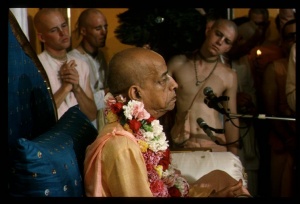SB 9.22.16-17: Difference between revisions
m (1 revision(s)) |
No edit summary |
||
| Line 1: | Line 1: | ||
{{info | {{info | ||
|speaker= | |speaker=Śukadeva Gosvāmī | ||
|listener=King | |listener=King Parīkṣit | ||
}} | }} | ||
[[Category:Srimad-Bhagavatam - Canto 09 Chapter 22]] | |||
[[Category:Bhagavatam Verses Spoken by Sukadeva Gosvami - Vanisource|092216]] | |||
<div style="float:left">'''[[Srimad-Bhagavatam]] - [[SB 9|Ninth Canto]] - [[SB 9|Ninth Canto]] - [[SB 9.22: The Descendants of Ajamidha|Chapter 22: The Descendants of Ajamīḍha]]'''</div> | |||
<div style="float:right">[[File:Go-previous.png|link=SB 9.22.14-15]] '''[[SB 9.22.14-15]] - [[SB 9.22.18-19]]''' [[File:Go-next.png|link=SB 9.22.18-19]]</div> | |||
{{RandomImage}} | |||
==== TEXTS 16-17 ==== | ==== TEXTS 16-17 ==== | ||
<div | <div class="verse"> | ||
evam ukto dvijair jyeṣṭhaṁ | :evam ukto dvijair jyeṣṭhaṁ | ||
chandayām āsa so 'bravīt | :chandayām āsa so 'bravīt | ||
tan-mantri-prahitair viprair | :tan-mantri-prahitair viprair | ||
vedād vibhraṁśito girā | :vedād vibhraṁśito girā | ||
veda-vādātivādān vai | |||
tadā devo vavarṣa ha | :veda-vādātivādān vai | ||
devāpir yogam āsthāya | :tadā devo vavarṣa ha | ||
kalāpa-grāmam āśritaḥ | :devāpir yogam āsthāya | ||
:kalāpa-grāmam āśritaḥ | |||
</div> | </div> | ||
| Line 21: | Line 27: | ||
==== SYNONYMS ==== | ==== SYNONYMS ==== | ||
<div | <div class="synonyms"> | ||
''evam''—thus (as above mentioned); ''uktaḥ''—being advised; ''dvijaiḥ''—by the ''brāhmaṇas''; ''jyeṣṭham''—unto his eldest brother, Devāpi; ''chandayām āsa''—requested to take charge of the kingdom; ''saḥ''—he (Devāpi); ''abravīt''—said; ''tat-mantri''—by Śāntanu's minister; ''prahitaiḥ''—instigated; ''vipraiḥ''—by the ''brāhmaṇas''; ''vedāt''—from the principles of the ''Vedas''; ''vibhraṁśitaḥ''—fallen; ''girā''—by such words; ''veda-vāda-ativādān''—words blaspheming the Vedic injunctions; ''vai''—indeed; ''tadā''—at that time; ''devaḥ''—the demigod; ''vavarṣa''—showered rains; ''ha''—in the past; ''devāpiḥ''—Devāpi; ''yogam āsthāya''—accepting the process of mystic ''yoga''; ''kalāpa-grāmam''—the village known as Kalāpa; ''āśritaḥ''—took shelter of (and is living in even now). | |||
</div> | </div> | ||
| Line 28: | Line 34: | ||
==== TRANSLATION ==== | ==== TRANSLATION ==== | ||
<div | <div class="translation"> | ||
When the brāhmaṇas said this, Mahārāja Śāntanu went to the forest and requested his elder brother Devāpi to take charge of the kingdom, for it is the duty of a king to maintain his subjects. Previously, however, Śāntanu's minister Aśvavāra had instigated some brāhmaṇas to induce Devāpi to transgress the injunctions of the Vedas and thus make himself unfit for the post of ruler. The brāhmaṇas deviated Devāpi from the path of the Vedic principles, and therefore when asked by Śāntanu he did not agree to accept the post of ruler. On the contrary, he blasphemed the Vedic principles and therefore became fallen. Under the circumstances, Śāntanu again became the king, and Indra, being pleased, showered rains. Devāpi later took to the path of mystic yoga to control his mind and senses and went to the village named Kalāpagrāma, where he is still living. | When the brāhmaṇas said this, Mahārāja Śāntanu went to the forest and requested his elder brother Devāpi to take charge of the kingdom, for it is the duty of a king to maintain his subjects. Previously, however, Śāntanu's minister Aśvavāra had instigated some brāhmaṇas to induce Devāpi to transgress the injunctions of the Vedas and thus make himself unfit for the post of ruler. The brāhmaṇas deviated Devāpi from the path of the Vedic principles, and therefore when asked by Śāntanu he did not agree to accept the post of ruler. On the contrary, he blasphemed the Vedic principles and therefore became fallen. Under the circumstances, Śāntanu again became the king, and Indra, being pleased, showered rains. Devāpi later took to the path of mystic yoga to control his mind and senses and went to the village named Kalāpagrāma, where he is still living. | ||
</div> | </div> | ||
__NOTOC__ | |||
<div style="float:right; clear:both;">[[File:Go-previous.png|link=SB 9.22.14-15]] '''[[SB 9.22.14-15]] - [[SB 9.22.18-19]]''' [[File:Go-next.png|link=SB 9.22.18-19]]</div> | |||
__NOTOC__ | |||
__NOEDITSECTION__ | |||
Revision as of 11:17, 17 May 2021

A.C. Bhaktivedanta Swami Prabhupada
TEXTS 16-17
- evam ukto dvijair jyeṣṭhaṁ
- chandayām āsa so 'bravīt
- tan-mantri-prahitair viprair
- vedād vibhraṁśito girā
- veda-vādātivādān vai
- tadā devo vavarṣa ha
- devāpir yogam āsthāya
- kalāpa-grāmam āśritaḥ
SYNONYMS
evam—thus (as above mentioned); uktaḥ—being advised; dvijaiḥ—by the brāhmaṇas; jyeṣṭham—unto his eldest brother, Devāpi; chandayām āsa—requested to take charge of the kingdom; saḥ—he (Devāpi); abravīt—said; tat-mantri—by Śāntanu's minister; prahitaiḥ—instigated; vipraiḥ—by the brāhmaṇas; vedāt—from the principles of the Vedas; vibhraṁśitaḥ—fallen; girā—by such words; veda-vāda-ativādān—words blaspheming the Vedic injunctions; vai—indeed; tadā—at that time; devaḥ—the demigod; vavarṣa—showered rains; ha—in the past; devāpiḥ—Devāpi; yogam āsthāya—accepting the process of mystic yoga; kalāpa-grāmam—the village known as Kalāpa; āśritaḥ—took shelter of (and is living in even now).
TRANSLATION
When the brāhmaṇas said this, Mahārāja Śāntanu went to the forest and requested his elder brother Devāpi to take charge of the kingdom, for it is the duty of a king to maintain his subjects. Previously, however, Śāntanu's minister Aśvavāra had instigated some brāhmaṇas to induce Devāpi to transgress the injunctions of the Vedas and thus make himself unfit for the post of ruler. The brāhmaṇas deviated Devāpi from the path of the Vedic principles, and therefore when asked by Śāntanu he did not agree to accept the post of ruler. On the contrary, he blasphemed the Vedic principles and therefore became fallen. Under the circumstances, Śāntanu again became the king, and Indra, being pleased, showered rains. Devāpi later took to the path of mystic yoga to control his mind and senses and went to the village named Kalāpagrāma, where he is still living.